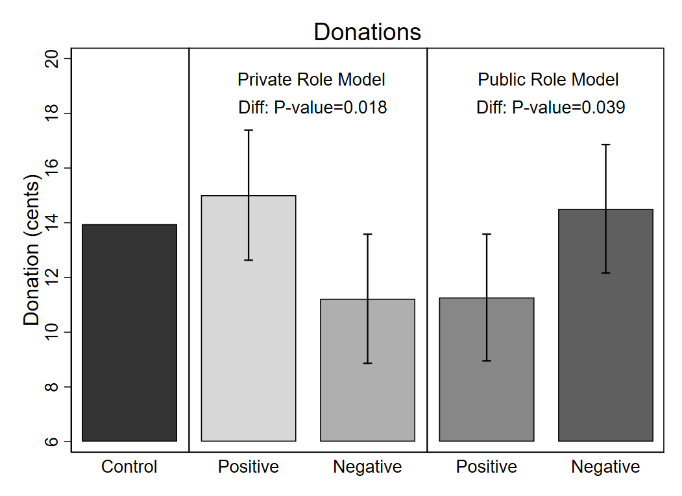
We take cues about how to behave from other people, especially in times of great uncertainty like the current Covid-19 pandemic. Home-bound, many currently turn to the media to learn about the actions of fellow citizens and political leaders. Imagine you are watching the evening news and you see coverage of people defying social distancing guidelines, partying on the beach or congregating in bars. Would you give up on flattening the curve of Covid-19 infection or would you increase your efforts to make up for the failings of others? What if, instead, you saw reports of thousands of people volunteering as health workers in their communities? Would you be inspired and join in or sit back knowing that others are filling the void?
In recent work, Willa Brown and I provide some answers to these questions, based on an experiment with people recruited online in the US. We randomly assigned participants to watch a video showing either private citizens or politicians behaving in ways that have either a negative or a positive effect on preventing the spread of the coronavirus. We measured effects on two forms of pro-social behavior: how much money people donated to the Center for Disease Control (CDC) Emergency Fund, and whether they spent time learning about local volunteering opportunities related to Covid-19.
Participants who watched positive citizen role models donated 34% more money and expressed more interest in volunteering than those watching people disobey social distancing guidelines. However, the results look very different for public role models. Participants who watched elected officials acting pro-socially (leading the public health response) donated 29% less and were 53% less likely to take steps to learn about volunteering opportunities compared to people who watched politicians mismanaging the crisis. The results for donations are shown in the figure; those for volunteering look quite similar.

Our findings suggest that people treat the actions of government officials as substitutes, and those of fellow citizens as complements, to their own actions. We go along with what the rest of the “herd” does, but we act so as to offset what our “leaders” do.
These results can be reconciled by the view that pro-social behavior depends on both the adoption of pro-social norms and a sense of responsibility among individuals for taking actions that satisfy those norms. Trust is one of the key norms among groups that succeed in acting pro-socially. The majority of people are “strategic cooperators”: they are willing to contribute to a public good if they believe that others will do the same. Our work shows that trust is influenced by the actions of private role models: people who watched positive examples were 21% more likely to agree with the statement “Most people can be trusted” than those who watched the negative examples of private role models.
By contrast, public role models do not affect trust norms. They do, however, influence whether people feel responsible to contribute to a collective activity. Watching a video of failing political leaders led to a 70% increase in the share of participants who reported that personal responsibility to take action was an important factor in their decision about how much to donate. This increase in responsibility and pro-social behavior when exposed to negative public role models is particularly strong among women.
Overall, positive private role models are effective because they increase norms of trust. Negative public role models increase pro-social behavior because they increase people’s feelings of a responsibility to “step up” and take action. Put differently, people may compensate for the failures of a country’s government to take positive action by doing so themselves.
© Martin Abel
Martin Abel is assistant professor of economics at Middlebury College, USA, and a Research Affiliate at IZA, Germany
Read more on the coronavirus crisis:
"Coronavirus and the labor market," by Daniel S. Hamermesh
"Fighting a coronavirus recession," by Daniel S. Hamermesh
"Pandemics and the labor market—Then and now," by Karen Clay
"Pricing the lives saved by coronavirus policies," by W. Kip Viscusi
"Health effects of the coronavirus recession," by Christopher J. Ruhm
"The long-term consequences of missing a term of school," by Simon Burgess and Hans Sievertsen
"Coronavirus, telecommuting, and the labor market," by Nikos Askitas
"Expectations about Covid-19 social-distancing measures in Italy and their impact on compliance," by Guglielmo Briscese, Nicola Lacetera, Mario Macis, and Mirco Tonin
"The coronavirus crisis and the next generation," by Bart Cockx
"Korea: A paragon of dealing with coronavirus," by Sok Chul Hong
"Economic implications of postponing the Tokyo 2020 Olympic Games," by Peter J. Sloane
"The sudden growth of employee autonomy during the coronavirus lockdown," by Elisa Gerten and Michael Beckmann
"Mitigating the work–safety trade-off," by Tito Boeri, Alessandro Caiumi, Marco Paccagnella
"Trading off lives for jobs," by Daniel S. Hamermesh
"Trends in Covid-19 infection: What New York City neighborhoods tell us," by George J. Borjas
"Labor markets during the Covid-19 crisis: A preliminary view," by Olivier Coibion, Yuriy Gorodnichenko, Michael Weber
"Did California’s shelter-in-place order work? Early coronavirus-related public health effects," by Andrew Friedsen, Drew McNichols, Joseph J. Sabia, Dhaval Dave
"200 billion hours to spend: The Covid-19 opportunity to upskill," by Peter Siminski, Emil Temnyalov
"The CARES Act—Massive government intervention in the economic crisis," by Richard Prisinzano
"What is happening to unemployment in the post-Covid-19 labor market?," by Katharine G. Abraham
"Measuring employment and unemployment—Primer and predictions," by Daniel S. Hamermesh
"Can inflation be accurately measured during a lockdown?," by Erwin Diewert and Kevin J. Fox
"The Covid-19 crisis exacerbates workplace injustices," by Philippe Askenazy
"Graduating during the Covid-19 recession," by Philip Oreopoulos
"Covid-19 and immigrant employment," by George J. Borjas, Hugh Cassidy
"So happy together?," by Daniel S. Hamermesh
"Covid-19’s impact on the economy: Measuring GDP during a pandemic," by J. Steven Landefeld
"Childcare during Covid-19," by Almudena Sevilla and Sarah Smith
"Labor markets in the Covid-19 pandemic: Western Europe and the US," by Hans-Martin von Gaudecker
"Effects of Covid-19 on spending and saving," by Seonghoon Kim, Kanghyock Koh, Xuan Zhang
"Lockdowns and traffic accidents," by Umut Oguzoglu
Please note:
We recognize that IZA World of Labor articles may prompt discussion and possibly controversy. Opinion pieces, such as the one above, capture ideas and debates concisely, and anchor them with real-world examples. Opinions stated here do not necessarily reflect those of the IZA.